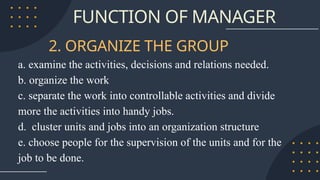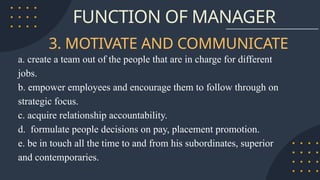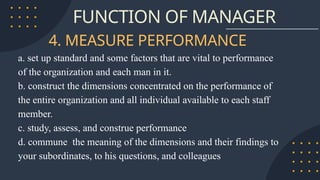Lesson 2: Function, Skill, Roles of a Manager
- 1. LESSON 2 FUNCTIONS, ROLES, AND SKILLS OF A MANAGER ORGANIZATION AND MANAGEMENT
- 2. ? identify and explain the different function of a manager ? distinguish the contribution of the manager to the organization ? Evaluate the roles of a manager and provide emphasis of its importance and ? assess and analyze the skills that manager should posses according to his/her level of performance LEARNING OBJECTIVES
- 3. ? The manager is the one who plans, organizes, lead and controls the people in the process of achieving the goals and objectives of an organization. ? Managers supervise, sustain, uphold, and assume responsibility for the work of others in his/ her group, team, department or the organization, in general. WHAT IS MANAGER?
- 5. FUNCTION OF MANAGER 1. SET OBJECTIVE AND PLAN a. settle on the objectives congruent with the corporate vision and mission statement. b. establish the goals in every area of objectives. c. choose what has to be done to attain the objectives. d. communicate the objectives to the people whose act is required to reach them
- 6. FUNCTION OF MANAGER 2. ORGANIZE THE GROUP a. examine the activities, decisions and relations needed. b. organize the work c. separate the work into controllable activities and divide more the activities into handy jobs. d. cluster units and jobs into an organization structure e. choose people for the supervision of the units and for the job to be done.
- 7. FUNCTION OF MANAGER 3. MOTIVATE AND COMMUNICATE a. create a team out of the people that are in charge for different jobs. b. empower employees and encourage them to follow through on strategic focus. c. acquire relationship accountability. d. formulate people decisions on pay, placement promotion. e. be in touch all the time to and from his subordinates, superior and contemporaries.
- 8. FUNCTION OF MANAGER 4. MEASURE PERFORMANCE a. set up standard and some factors that are vital to performance of the organization and each man in it. b. construct the dimensions concentrated on the performance of the entire organization and all individual available to each staff member. c. study, assess, and construe performance d. commune the meaning of the dimensions and their findings to your subordinates, to his questions, and colleagues
- 9. FUNCTION OF MANAGER 5. DEVELOP PEOPLE a. improve himself as a manager b. build up others
- 11. MANAGERIAL LEVEL TOP- LEVEL MANAGERS ? Are executives with cross departmental duties, who are responsible for the overall direction of the organization. Examples: ? Position like Chief Executive Officer (CEO) ? Chief Operating Officer (COO) ? Chief Financial Officer (CFO)
- 12. MANAGERIAL LEVEL MIDDLE- LEVEL MANAGERS ? Are responsible for looking for the best way on organizing human and other resources to accomplish or ganizational objectives. Examples: ? General Manager ? Regional Manager ? Divisional Manager in an organization
- 13. MANAGERIAL LEVEL FIRST LINE MANAGERS ? Cater to the day-to-day operations of the organization. They are directly involved with people who are directly responsible for producing the companyˇŻs goods and services. They hold positions including office manager, shift supervisor, department manager.
- 14. MANAGERIAL ROLES
- 15. ? Managerial Roles refers to specific actions or behaviors expected of and exhibited by a manager . MANAGERIAL ROLES HENRY MINTZBERG ? A management researcher believes that managers can best described through the roles they perform within organization. ? He identified ten managerial roles which he categorized as Interpersonal, Informational, and Decisional Management Roles
- 16. INTERPERSONAL ROLES These roles involve interactions with people inside and outside the organization, building relationships, and providing leadership.
- 17. INTERPERSONAL ROLES LEADER encompasses relationship with subordinates including motivation, communication nad influence FIGURE HEAD Performs social, inspirational, legal, and ceremonial duties. LAISON Makes linkages with people in and outside of the organization
- 18. INFORMATION ROLES These roles involve processing, sharing, and analyzing information that is essential for decision-making and effective management.
- 19. DISSEMINATOR the manager share the information collected with subordinates and others in company. INFORMATIONAL ROLES MONITOR manager scan the environment for information SPOKESPERSON the manager represent his organization or unit with interacting with outsiders like customer, financer, suppliers or other agencies in society
- 20. DECISIONAL ROLES These roles involve making choices and decisions that affect the organization or its components.
- 21. DECISIONAL ROLES He has to take care of certain pressure and problems in organization especially those that are serve that demand immediate attention and action. CONFLICT HANDLER ENTREPRENEUR as an entrepreneur the manager assumes certain risks which can affect the organization.
- 22. DECISIONAL ROLES Has to reach agreements with other manager regarding the first right to resources within and outside the organization. NEGOTIATOR RESOURCE ALLOCATOR Fulfill the demand of various units in terms of human physical and financial
- 23. DECISIONAL ROLES DECISION MAKER This encompasses the overall responsibility for making strategic decisions that affect the direction of the organization, weighing, and considering the impact of those decision.
- 25. TECHNICAL SKILLS Requires the ability to apply proficiency or expertise to perform particular task.
- 26. HUMAN SKILLS The ability to soundly work in cooperation with others. Human skills emerge in the workplace as a spirit of trust, enthusiasm, and genuine involvement in interpersonal relationship.
- 27. CONCEPTUAL SKILLS The ability to see the total picture of the organization, to know how the different parts affect each other and how the company fits into or is affected by the external environment.
- 28. thank



























